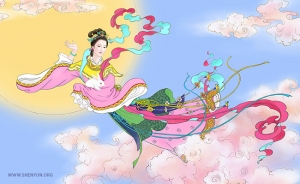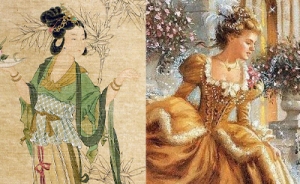What Does "Shen Yun" Mean?
Many people think Chinese is an incredibly difficult language to learn. However, I see it more as a consistently rewarding and challenging experience of delving into the oldest continuous language on the planet. I say it's rewarding because of the joy of learning the inner meanings behind each character. Yet the challenge lies in that these inner meanings are hard to express, much less directly translate into English. And there couldn't be a better example of this than in our very name: Shen Yun.
The character Shen (神) is a general term for divine being. This already poses a challenge for westerners accustomed to using the term God to mean one supreme heavenly being. Chinese spirituality on the other hand, is replete with hundreds of deities, Buddhas, and Taoist immortals who play different roles and color the canon of Chinese history with thousands of rich stories.
This feeling of the divine segues into the second character of our name: Yun (韻). Now, the literal meaning of this character is “rhyme” or “rhythm.” So does Shen Yun then mean “Divine Rhyme?” Not exactly. You see, this is where Chinese gets tricky. “Yun” here, refers to the entire bearing of an individual—the subtleties of one's every movement—the expressions of one's body language.
So those of you who have been to our show might remember me and my co-hostess teaching the audience how to say Shen Yun. Unfortunately, on stage I don't have the luxury of a blog entry to explain the subtleties of the Chinese language. So during the performance I just say that Shen Yun means: the beauty of divine beings dancing.
You might be confused at this point: how did “divine rhyme” turn into “the beauty of divine beings dancing?” Well, if we think about Yun as the bearing of an individual, then Shen Yun can be seen as the expression and representation of divine beings. And one way this feeling has been expressed in Chinese history is through dance. Just look at China’s ancient Buddhist Dunhuang cave sculptures and murals. The grace, compassion, and sublime beauty of heavenly realms can be seen through the subtlest expressions and gestures of the depicted dancing goddesses. This is the essence of the words “Shen Yun.”
So there you have it, though after reading this I'm sure you'll agree that our dancers do a much better job expressing this divine feeling than I ever could!

Ben Freed
Master of Ceremonies
15 september, 2010






